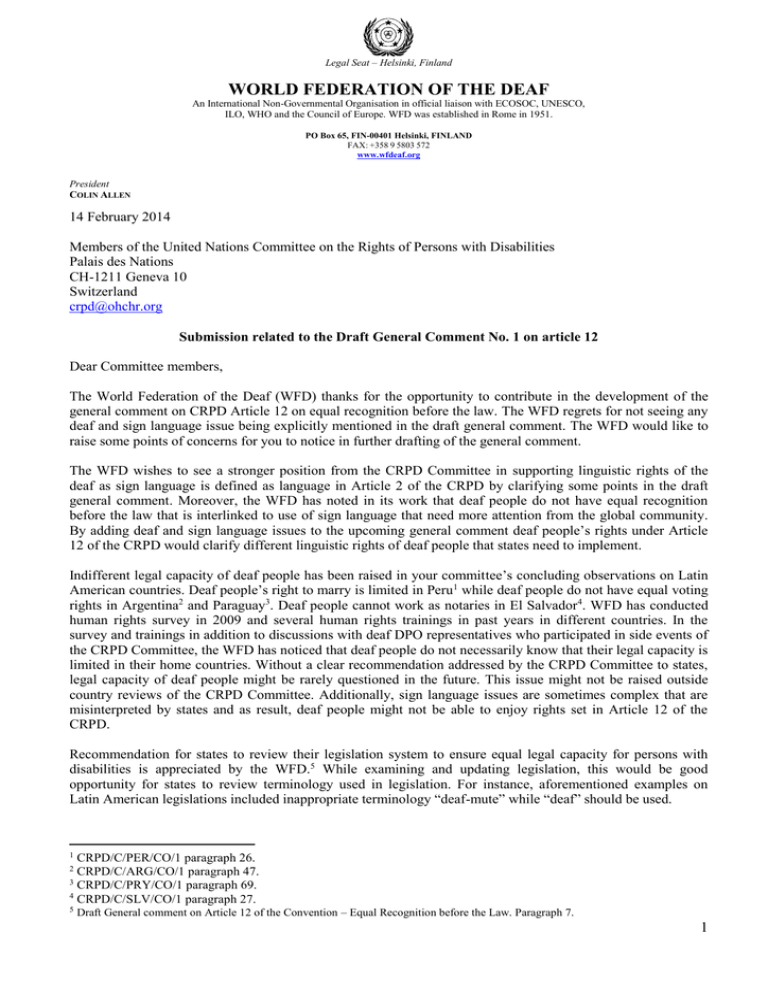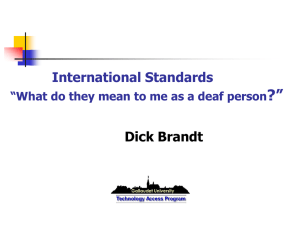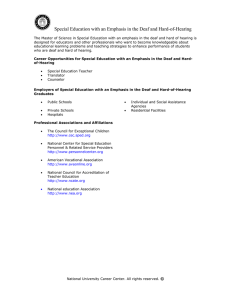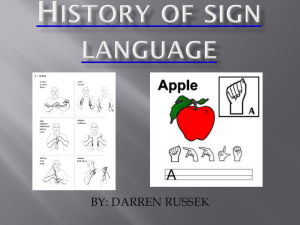WORLD FEDERATION OF THE DEAF
advertisement

Legal Seat – Helsinki, Finland WORLD FEDERATION OF THE DEAF An International Non-Governmental Organisation in official liaison with ECOSOC, UNESCO, ILO, WHO and the Council of Europe. WFD was established in Rome in 1951. PO Box 65, FIN-00401 Helsinki, FINLAND FAX: +358 9 5803 572 www.wfdeaf.org President COLIN ALLEN 14 February 2014 Members of the United Nations Committee on the Rights of Persons with Disabilities Palais des Nations CH-1211 Geneva 10 Switzerland crpd@ohchr.org Submission related to the Draft General Comment No. 1 on article 12 Dear Committee members, The World Federation of the Deaf (WFD) thanks for the opportunity to contribute in the development of the general comment on CRPD Article 12 on equal recognition before the law. The WFD regrets for not seeing any deaf and sign language issue being explicitly mentioned in the draft general comment. The WFD would like to raise some points of concerns for you to notice in further drafting of the general comment. The WFD wishes to see a stronger position from the CRPD Committee in supporting linguistic rights of the deaf as sign language is defined as language in Article 2 of the CRPD by clarifying some points in the draft general comment. Moreover, the WFD has noted in its work that deaf people do not have equal recognition before the law that is interlinked to use of sign language that need more attention from the global community. By adding deaf and sign language issues to the upcoming general comment deaf people’s rights under Article 12 of the CRPD would clarify different linguistic rights of deaf people that states need to implement. Indifferent legal capacity of deaf people has been raised in your committee’s concluding observations on Latin American countries. Deaf people’s right to marry is limited in Peru1 while deaf people do not have equal voting rights in Argentina2 and Paraguay3. Deaf people cannot work as notaries in El Salvador4. WFD has conducted human rights survey in 2009 and several human rights trainings in past years in different countries. In the survey and trainings in addition to discussions with deaf DPO representatives who participated in side events of the CRPD Committee, the WFD has noticed that deaf people do not necessarily know that their legal capacity is limited in their home countries. Without a clear recommendation addressed by the CRPD Committee to states, legal capacity of deaf people might be rarely questioned in the future. This issue might not be raised outside country reviews of the CRPD Committee. Additionally, sign language issues are sometimes complex that are misinterpreted by states and as result, deaf people might not be able to enjoy rights set in Article 12 of the CRPD. Recommendation for states to review their legislation system to ensure equal legal capacity for persons with disabilities is appreciated by the WFD.5 While examining and updating legislation, this would be good opportunity for states to review terminology used in legislation. For instance, aforementioned examples on Latin American legislations included inappropriate terminology “deaf-mute” while “deaf” should be used. 1 CRPD/C/PER/CO/1 paragraph 26. CRPD/C/ARG/CO/1 paragraph 47. 3 CRPD/C/PRY/CO/1 paragraph 69. 4 CRPD/C/SLV/CO/1 paragraph 27. 2 5 Draft General comment on Article 12 of the Convention – Equal Recognition before the Law. Paragraph 7. 1 The WFD would appreciate if professional sign language interpretation can be added as example of assistance in communication in paragraph 15 of the draft general comment.6 Otherwise there is a significant risk for deaf people being pressured to use their family members as assistance in sign language as this would be free of cost for states. The WFD does not accept this kind of situation under any circumstance. The list of conditions for supported decision-making in paragraph 25 includes mode of communication.7 According to Article 2 of the CRPD, sign languages should not be considered solely as a mode of communication. The WFD would like to request an item on sign language issue to be added to the list as following “Deaf people have the right to use sign language in all areas of their lives that must be noted when supported decision-making is in question. This right includes obligation for states to provide professional sign language interpretation to a deaf individual when supported decision-making is exercised.” Otherwise there is significant risk for deaf people being pressured to communicate in writing or rely on someone who knows sign language without being professional sign language interpreter. Thus deaf people’s right to use sign language would not be ensured without a specific explanation on the use of sign language in the list. The right to exercise legal capacity in access to justice in paragraph 35 includes examples of various forms of support.8 The WFD has been informed about some misinterpretations on the possibility of deaf people to e.g. testify. There have been understandings that e.g. a deaf person could testify only if a judge knows sign language herself/himself. Another example could be seen from concluding observations on Argentina raising concern on the requirement for deaf people to be able to communicate in written language9 that is a situation that is likely to occur in other countries. The WFD views such a requirement as violation of human rights of deaf people to use their languages. Under risk of such false interpretations of the capacity of deaf people to exercise legal capacity, the WFD wishes to see “Deaf people must be provided professional sign language interpretation and allowed to use interpretation regardless their roles in all judicial, administrative and other adjudicative proceedings.” to be added in paragraph 35. Based on aforementioned arguments, I would like to stress the importance of taking issues related to legal capacity of deaf people into account when you draft the general comment. Please do not hesitate to contact us if you have further questions. Kind regards, Eeva Tupi Human Rights Officer World Federation of the Deaf eeva.tupi@kl-deaf.fi Sources: Committee on the Rights of Persons with Disabilities: Concluding observations on the initial report of Argentina as approved by the Committee at its eighth session (17–28 September 2012). CRPD/C/ARG/CO/1. Committee on the Rights of Persons with Disabilities: Concluding observations on the initial report of El Salvador, adopted by the Committee at its tenth session (2-13 September 2013). CRPD/C/SLV/CO/1. Committee on the Rights of Persons with Disabilities: Concluding observations on the initial report of Paraguay, adopted by the Committee at its ninth session, 15–19 April 2013. CRPD/C/PRY/CO/1. Committee on the Rights of Persons with Disabilities: Consideration of reports submitted by States parties under article 35 of the Convention. Concluding observations of the Committee on the Rights of Persons with Disabilities. Seventh session 16-20 April 2012. CRPD/C/PER/CO/1. Draft General comment on Aricle 12 of the Convention – Equal Recognition before the Law. Paragraph 15. Draft General comment on Article 12 of the Convention – Equal Recognition before the Law. Paragraph 25. 8 Draft General comment on Article 12 of the Convention – Equal Recognition before the Law. Paragraph 35. 9 CRPD/C/ARG/CO/1 paragraph 47. 6 7 2



